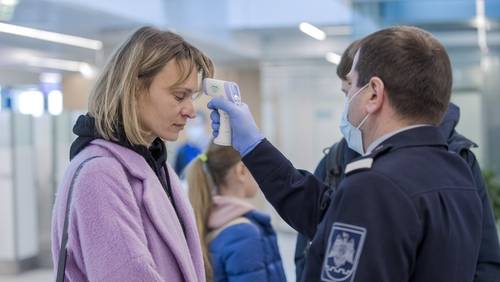Coronavirus: Europe readies plans for worst-case scenario

Stay tuned with 24 News HD Android App

From calling in the army to requisitioning hospital beds, European nations are drawing up emergency plans should the coronavirus outbreak reach pandemic proportions and severely disrupt daily life.
Here's a look at how countries plan to respond to a worst-case scenario.
AUSTRIA
The Austrian government has not yet unveiled an emergency plan but said it will take steps as and when they become necessary. Officials have not ruled out sealing off affected towns or villages.
BRITAIN
The UK government estimates that up to one-fifth of employees could be off work at the peak of the outbreak.
The pressure on emergency services could see police concentrate on only the most serious crimes with hospitals delaying operations and bringing retired healthcare staff back to work.
The government would also try to slow the spread of the virus by closing schools, cancelling large gatherings and encouraging people to work from home.
ESTONIA
Estonian Interior Minister Mart Helme has said police and border guards are ready to assist with enforcing quarantine, even without declaring an emergency.
The government plans to discuss additional measures on Thursday.
FRANCE
The French army is "ready to intervene if it becomes necessary", Defence Minister Florence Parly has said, without giving details.
Military hospitals are on standby to take in COVID-19 patients, she added.
GERMANY
German Health Minister Jens Spahn said health workers would focus on "the most acute" cases if the outbreak worsens, meaning planned, non-urgent surgeries could be postponed.
Sealing off entire towns or villages if they become affected by the virus "would be a last resort", Interior Minister Horst Seehofer has said.
GREECE
The Greek government last month said a shutdown of some public areas and travel restrictions would be activated in a mass outbreak.
The measures, contained in a government decree, include temporary travel bans to and from countries with a large number of infections, and enable beds to be requisitioned in hotels and private clinics.
The decree also foresees the temporary closure of "indoor public gathering areas" such as schools, places of worship, cinemas, sports halls and businesses.
ITALY
The government has not released a worst-case plan but as the hardest-hit country in Europe it has already taken several exceptional measures, including quarantining 11 northern towns.
Churches, schools and museums have all been closed in the quarantine zone as well as in some other areas.
A decree expected to be adopted on Wednesday will be the first to apply to the entire country. It recommends that people keep a safe distance from each other, that those over 75 avoid public places and that football matches be played without fans.
School and university closures are also likely to be agreed.
LATVIA
The Latvian government is keeping 100 hospital beds reserved for potential coronavirus patients. The small Baltic country has just one case so far.
NETHERLANDS
The Netherlands has not yet revealed any worst-case scenario planning, but Health Minister Bruno Bruins has advised the country to go "one step further" in preparing for a large-scale outbreak.
This includes a call on hospitals to increase staff and look at alternative venues to house sick patients.
The health ministry is also working with municipalities and rescue services to prepare scripts with detailed instructions in case of a worsening epidemic. The Dutch parliament is to debate the measures on Thursday.
NORWAY
Health authorities have drawn up contingency plans for a scenario under which 25 percent of Norway's population becomes infected.
In such a situation, almost all scheduled surgeries not linked to the virus could be postponed to ease the burden on hospitals, especially intensive care units.
POLAND
Poland's parliament has passed legislation giving the government emergency powers to fight the virus's spread. That could include calling in the army, intervening directly in the market for medicines or restricting people's movements.
The draft legislation also includes allowing people to work from home and claim compensation in case of school closures.
